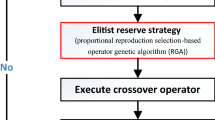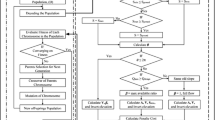Abstract
Niche genetic algorithm (NGA) is recommended for optimal design of gravity dam section and to overcome the defects of constant crossover probability and mutation probability, appearing precocious phenomena in the optimizing process in simple genetic algorithm (SGA). Thanks to NGA, the calculations are rapid and easy, and the optimization results are more close to the global optimal solution. Thus, it has been successfully applied to the optimal design of gravity dam section. The optimal results indicate that NGA is available in optimal designs of gravity dam section, and the results are safe, economical and rather ideal. Thereby, the optimal results can directly apply to engineering designs, and can provide reference for optimal design of gravity dam.
Access this chapter
Tax calculation will be finalised at checkout
Purchases are for personal use only
Preview
Unable to display preview. Download preview PDF.
Similar content being viewed by others
References
Zhou, M., Sun, S.: Genetic Algorithm Principle and Application, pp. 15–78. National Defense Industry Press, Beijing (1999)
Lei, Y., Zhang, S., Li, X., et al.: MATLAB GA Toolbox and Its Application, pp. 3–22. Xi’an University of Electronic Science and Technology Press, Xi’an (2005)
Sacco, W.F., Lapa, C.M.F., Pereira, C.M.N.A., et al.: A niching Genetic Algorithm Applied to a Nuclear Power Plant Auxiliary Feedwater System Surveillance Tests Policy Optimization. Annals of Nuclear Energy 33, 753–759 (2006)
Alugongo, A.A., Lange, J.M.: Optimization of Multimodal Models in Mechanical Design by a Niche Hybrid Genetic Algorithm. In: IEEE AFRICON 2009, Nairobi, Kenya, September 23-25, pp. 1–6 (2009)
Tu, Q.: Based on Niche Genetic Algorithm of Regional Water Resources Optimization Allocation. Water Technology and Economy 14(3), 209–1609 (2008)
Chen, C., Gong, X.: Based on niche genetic algorithm on soft soil ground embankment stability analysis. Engineering Geological Journals 2(4), 520–2938
Zhao, J., Li, S., Fu, Y., et al.: Based on Adaptive Genetic Algorithm Gravity Dam Shape Optimization Design. Hong Shui He 23(3), 44–46 (2004)
Chen, S.-K., Zhu, Y.-M., Shuai, W.: Back Analysis of Thermal Field of Concrete and Its Application Based on Niche Genetic Algorithms. In: The 2nd IEEE International Conference on Information Management and Engineering (ICIME), Chengdu, China, April 16-18, pp. 403–407 (2010)
Author information
Authors and Affiliations
Editor information
Editors and Affiliations
Rights and permissions
Copyright information
© 2011 Springer-Verlag Berlin Heidelberg
About this paper
Cite this paper
Hu, L., Chen, F., Li, Y. (2011). Research of Optimal Design for Gravity Dam Based on Niche Genetic Algorithm. In: Lin, S., Huang, X. (eds) Advanced Research on Computer Education, Simulation and Modeling. CESM 2011. Communications in Computer and Information Science, vol 176. Springer, Berlin, Heidelberg. https://doi.org/10.1007/978-3-642-21802-6_52
Download citation
DOI: https://doi.org/10.1007/978-3-642-21802-6_52
Publisher Name: Springer, Berlin, Heidelberg
Print ISBN: 978-3-642-21801-9
Online ISBN: 978-3-642-21802-6
eBook Packages: Computer ScienceComputer Science (R0)




